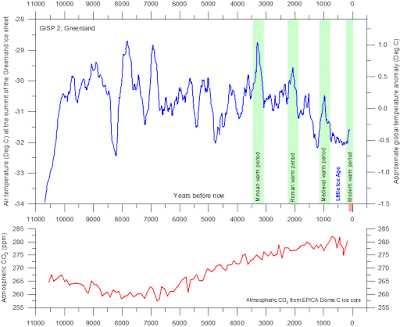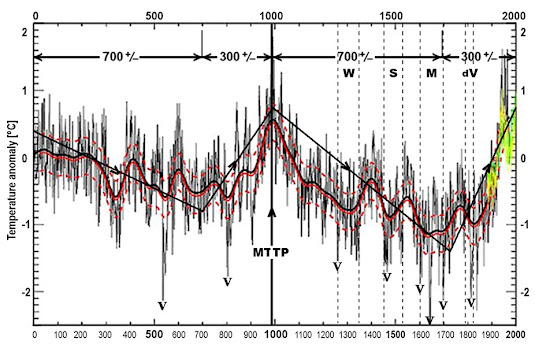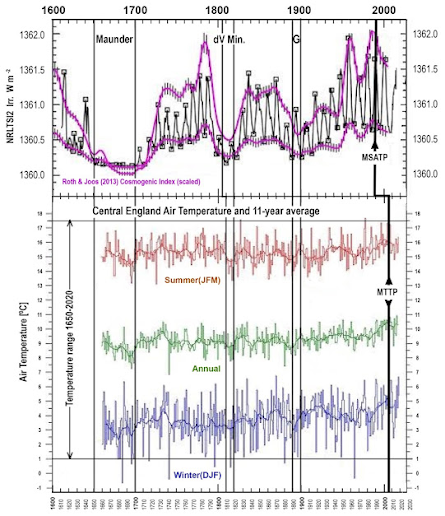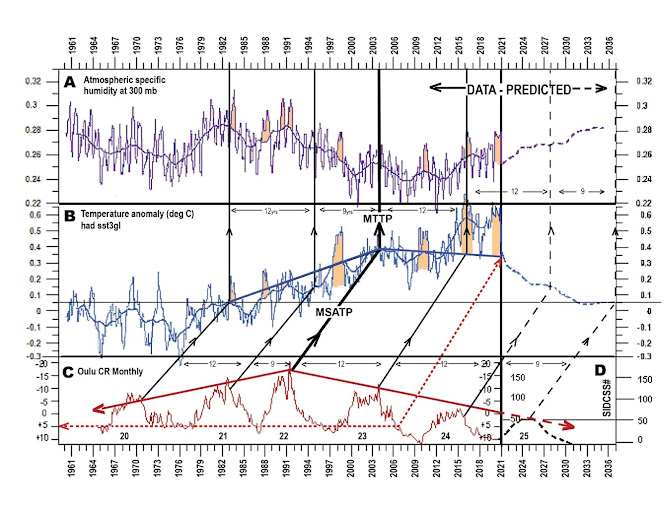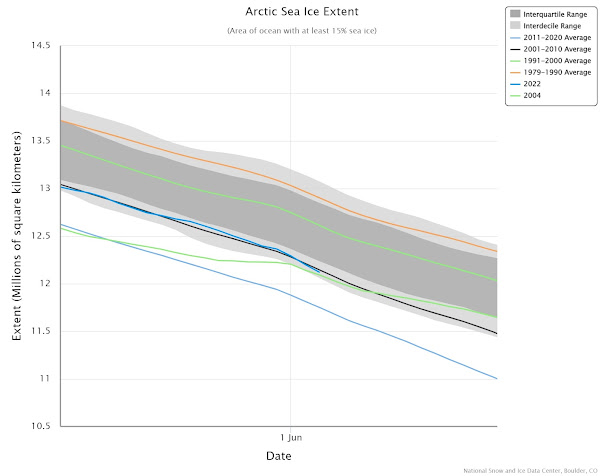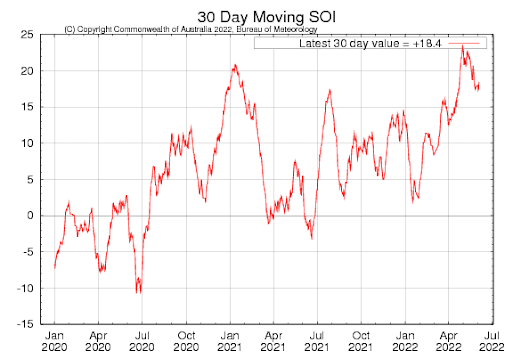Earth’s climate is the result of resonances and beats between the phases of natural cyclic processes of varying wavelengths and amplitudes. At all scales, including the scale of the solar planetary system, sub-sets of oscillating systems develop synchronous behaviors which then produce changing patterns of periodicities in time and space in the emergent temperature data. The periodicities pertinent to current estimates of future global temperature change fall into two main categories:
a) The orbital long wave Milankovitch eccentricity, obliquity and precession cycles. These control the glacial and interglacial periodicities and the amplitudes of the corresponding global temperature cycles.
b) Solar activity cycles with multi-millennial, millennial, centennial and decadal time scales.
The most prominent solar activity and temperature cycles are : Schwab-11+/-years ; Hale-22 +/-years ; 3 x the Jupiter/Saturn lap cycle 60 years +/- :; Gleissberg 88+/- ; de Vries - 210 years+/-; Millennial- 960-1020 +/-. (1)
Fig. 1 Greenland Ice core derived temperatures and CO2 from Humlum 2016 (2)
Fig.1 shows that Earth has passed the warm peak of the current Milankovitch interglacial and has been generally cooling for the last 3,300 years. The millennial cycle peaks are apparent at about 10,000, 9,000, 8,000, 7,000, 2,000, and 1,000 years before now.
Climate, and in particular precipitation, is dominated mainly by the Obliquity modulated by the Precession. J. H. C. Bosmans et al 2015 (3)"Obliquity forcing of low-latitude climate" shows that obliquity induced changes in the summer cross-equatorial insolation gradient explain obliquity signals in low latitude paleo climate records more usefully than the classical 65 degree north insolation curve alone. Yi Liu et al 2015 (4) in "Obliquity pacing of the western Pacific Intertropical Convergence Zone over the last 282,000 years " " ... shows that the western Pacific ITCZ migration was influenced by combined precession and obliquity changes. The obliquity forcing could be primarily delivered by a cross-hemispherical thermal/pressure contrast, resulting from the asymmetric continental configuration between Asia and Australia in a coupled East Asian–Australian circulation system. "
The Oulu Galactic Ray Count is used in this paper as the "solar activity " proxy which integrates changes in Solar Magnetic field strength, Total Solar Insolation , Extreme Ultra Violet radiation, Interplanetary Magnetic Field strength, Solar Wind density and velocity, Coronal Mass Ejections, proton events, ozone levels and the geomagnetic Bz sign. Changes in the GCR neutron count proxy source causes concomitant modulations in cloud cover and thus albedo. (Iris effect)
Eschenbach 2010 (5) introduced “The Thunderstorm Thermostat Hypothesis - how Clouds and Thunderstorms Control the Earth’s Temperature”.
Eschenbach 2020(6) in https://whatsupwiththat.com/2020/01/07/drying-the-sky uses empirical data from the inter- tropical buoy system to provide a description of this system of self-organized criticality. Energy flow from the sun into and then out of the ocean- water interface in the Intertropical Convergence Zone results in a convective water vapor buoyancy effect and a large increase in OLR This begins when ocean temperatures surpass the locally critical sea surface temperature to produce Rayleigh - Bernard convective heat transfer.
3 The Millennial Temperature Cycle Peak.
Short term deviations from the solar activity and temperature cycles are driven by ENSO events and volcanic activity.
Latest UAH Satellite Data (7)
Global Temp Data 2003/12 Anomaly +0.26 : 2023/02 Anomaly -0.04 Net cooling for 19 years
NH Temp Data 2004/01 Anomaly +0.37 : 2023/02 Anomaly +0.17 Net cooling for 19 years
SH Temp Data 2003/11 Anomaly +0.21: 2023/02 Anomaly 0.0 Net cooling for 19 years
Tropics Temp Data 2004/01 Anomaly +0.22 : 2023/02 Anomaly - 0.11 Net cooling for 19 years.
USA 48 Temp Data 2004/03 Anomaly +1.32 : 2023/02 Anomaly + 0.68 Net cooling for 19 years.
Arctic Temp Data 2003/10 Anomaly +0.93 : 2023/02 Anomaly - 0.24 Net cooling for 19 years
Australia Temp Data 2004/02 Anomaly +0.80 : 2023/02 Anomaly - 0.12 Net cooling for 19 years
Fig 2 Correlation of the last 5 Oulu neutron cycles and trends with the Hadsst3 temperature trends and the 300 mb Specific Humidity. ( 8,9 )
The Oulu Cosmic Ray count in Fig.2C shows the decrease in solar activity since the 1991/92 Millennial Solar Activity Turning Point and peak There is a significant secular drop to a lower solar activity base level post 2007+/- and a new solar activity minimum late in 2009. In Figure 2 short term temperature spikes are colored orange and are closely correlated to El Ninos. The hadsst3gl temperature anomaly at 2037 is forecast to be + 0.05.
Fig.3 Northern Hemisphere 2000 year temperature reconstruction and a Millennial Temperature Turning Point. (MTTP). (7)
Because of the data quality, record length and methods used, the NH Christiansen et al 2012 series was selected as the "type reconstruction" to represent the NH trends. The de Vries, Maunder, Sporer and Wolf minima are noted. Important volcanic cooling events are marked with a V. An MTTP occurs at about 990. The Millennial cycles are asymmetric with a 700+/- year down-leg and a 300 +/- year up-leg.
Fig 4 The NRLTSI2 Solar Activity - CET Relationship 1600- Present (8,9,10)
In Fig.3 the Roth & Joos Cosmogenic Index (CI) is used as the emergent proxy for the solar activity driver of the resulting emergent global and NH temperature data.
The effect on observed emergent behaviors i.e. global temperature trends, of the combined effect of these solar and GCR drivers will vary non-linearly depending on the particular phases of the eccentricity, obliquity and precession orbital cycles at any particular time.
Figure 3 shows an increase in CI of about 2 W/m 2 from the Maunder minimum to the 1991 activity peak. This increase, together with the other solar "activity" variations modulate the earth’s temperature and albedo via the GR flux and varying cloud cover.
The emergent temperature time series trends of the combined orbital, solar and GCR drivers also reflect turning points, changes of state and important threshold effects created by the interactions of the underlying physical processes. These exogenous forcings are also simultaneously modulated by changes in the earth’s magnetic field and length of day.
The temperature increase since the 1680s is due to the up- leg in the natural solar " activity" Millennial cycle as shown by Lean 2018 "Estimating Solar Irradiance Since 850 AD" (ibid) Figure 3 also shows the correlation between the CI driver and the Central England Seasonal Temperatures. (ibid). The 1650 – 1700 (Maunder), 1810 - 20 (de Vries/Dalton), and the 1890-1900 (Gleissberg) minima are obvious.
These temperature changes correlate very well with the changes in energy flow from the sun shown in Figure 1 C without any measurable effect of C02.There is no CO2 caused climate crisis.
3.Arctic Sea Ice Trends.
After reaching the minimum on September 18 2022, Arctic sea ice extent has been steadily increasing. With the passage of the equinox, the sun has set at the North Pole. September average ice extent ended up tying with 2010 for eleventh lowest in the satellite record. 1.30 million square kilometers (502,000 square miles) above the record minimum set in 2012. (11)
4. Arctic Sea ice volume.
Arctic sea ice reached its maximum extent for the year, at 14.62 million square kilometers (5.64 million square miles) on March 6. The 2023 maximum is the fifth lowest in the 45-year satellite record.
It can now be plausibly conjectured that a Millennial sea level peak will follow the Millennial solar activity peak at 1991/92 . This may occur at a delay of one half of the fundamental 60 year cycle i.e at 2021/22. see Fairbridge and Sanders 1987 (18).A possible Sea Level Peak and Turning Point may have been reached on Sept 17th 2022 with an anomaly of 104 mm. The anomaly at Nov 25th 2022 was 103 mm .
The "consensus" IPCC models make the fundamental error of ignoring the long- term decline in solar activity and temperature following the Millennial Solar Activity Turning Point and activity peak which was reached in 1990/91 as shown in Figure 1
The amount of CO2 in the atmosphere is .058% by weight. That is one 1,720th of the whole. It is inconceivable thermodynamically that such a tiny tail could wag so big a dog. (13)
7. Predictions.
a) Short Term.
Svalgaard, (18) Says "That solar cycle prediction is still in its infancy is borne out by the extreme range of predictions of Cycle 25...........With the wide spread from 50, Kitiashvili (19), to 233,(McIntosh et al) "
In Fig 2 D above Kitiashvili,I 2020 (ibid) estimated that Solar Cycle 25 will start after the 2020 solar minimum and will be weaker than Cycle 24.The maximum of Cycle 25 solar activity in this paper is predicted to be at 2024/25 with a sunspot number of about 50 +/- 15. The correlative HadSST3gl anomaly is at 2037.The intervening solar activity minimum would be at 2031+/-.
The Oulu Galactic Ray Count is a much more useful proxy for the Solar "Activity" climate driver .The 1991 Solar Activity Peak and the key correlation with the secular drop in the GR count after 2007 are very obvious in Figure 2 C .The change in slope and projection beyond 2016 are related to that basic post 2007 baseline GCR shift.
b) Long Term.
Figure 4 shows that the up-leg in the Central England Temperature has an annual absolute temperature Millennial cycle amplitude of at least 16.5 +/- degrees C. Using the Millennial cycle lengths of Figure 3 at least that same amount of future cooling as from the 990 AD high (2004 analogy) to the Little Ice age is probable by the winters of 2,680-2700 +/-. The exact pathway from the 2003/4 Millennial temperature high to the 2700 +/-low cannot be determined, but we can have high confidence in the general trend.
Policymakers may wish to note the following possible effects on earth’s climate for this long cooling cycle. Climate in the Northern Hemisphere in particular will be more variable. From time to time the jet stream will swing more sharply North – South. with more northerly extreme heat waves, droughts and floods and more hard winters with more early fall and late spring frosts. A cooler world with lower SSTs usually means a dryer world. Thus droughts will be more likely in for example east Africa with possible monsoon failures in India. In California the PDO will mean less rainfall with more forest fires in the south. However in the Cascades and Northern Sierras snowpack could increase since more of the rain could occur as snow. In Europe cold winters and cool cloudy summers will be more frequent. .There will be a steeper temperature gradient from the tropics to the poles so that violent thunderstorms with associated flooding, tornadoes and blizards will be more frequent in the central USA. Hurricanes may strike the USA east coast with greater frequency in summer and storm related blizzards will be more common in winter.
8 The Rules of the Game - Energy Sources, Population Demographics and Sustainability.
The human species population level varies much like the slime mold Physarum polycephalum - we seek out and eat our carbon based food which was derived from the photosynthesis of solar energy. There are inter and intra species battles for the living space and its derived food Energy needed for survival. Humanity contends with all other species including COVID 19 and its variants in a Darwinian struggle for lebensraum.
"The Living Planet Report 2022 is a comprehensive study of trends in global biodiversity and the health of the planet. This flagship WWF publication reveals an average decline of 69% in species populations since 1970. While conservation efforts are helping, urgent action is required if we are to reverse nature loss."
Modern industrial civilization, especially in large Megacities, cannot function for long without continuous adequate power and water supply, and functional global food and basic resource supply chains. The Lebensraum war in Ukraine has given us a preview of wars yet to come. The UNEP, IPCC and UNFCCC “consensus” scientific community’s unwarranted focus on future CO2 levels, and global warming mitigation has led to “net zero” energy policies being adopted by most Governments. Mainstream Media, in particular the BBC, NGOs and leading left- wing politicians have rushed to promote this unnecessary, quasi-religious non -science. Reality has dictated that after only a few months of war many European nations have been forced to change their plans to move rapidly away from fossil fuels and /or find alternate sources for their fossil energy needs
Individual Governments, whether democratic or dictatorial have now to decide where and how they will draw the line between accommodation for other species and natural ecosystems and food supply, poverty reduction, economic development and consumer consumption levels. In the UK immigration policy led to Brexit In the USA the de facto open border policies of the Biden administration have become the cause of bitter political battles.
References.
2.Humlum O. An overview to get things into perspective, Figure 3, www.climate4you.com/ (2016) 3, www.climate4you.com/ (2016)
7. https://www.nsstc.uah.edu/data/msu/v6.0/tlt/uahncdc_lt_6.0.txt
